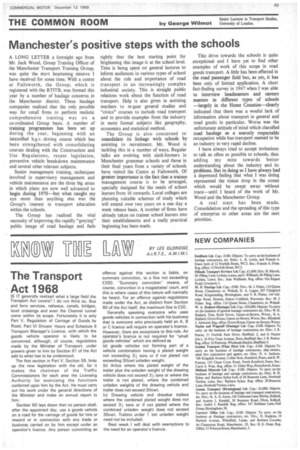Manchester's positive steps with the schools
Page 101

If you've noticed an error in this article please click here to report it so we can fix it.
A LONG LETTER a fortnight ago from Mr. Jack Wood, Group Training Officer of the Manchester Transport Training Group, was quite the moat heartening missive I have received for some time. With a centre at Failsworth, the Group, which is registered with the RTITB, was formed this year by a number of haulage concerns in the Manchester district. These haulage companies realized that the only possible way for small firms to perform realistic comprehensive training was on a co-ordinated Group basis. A number of training programmes has been set up during the year, beginning with an intensified h.g.v. driving course which has been strengthened with consolidating courses dealing with the Construction and Use Regulations, recent legislation. preventive vehicle breakdown maintenance and several other relevant subjects.
Senior management training, techniques involved in supervisory management and vehicle maintenance are the three big areas in which plans are now well advanced to begin during 1970—but what caught my eye more than anything else was the Group's interest in transport education within the schools.
The Group has realized the vital necessity of improving the rapidly "greying" public image of road haulage and feels rightly that the best starting point for brightening this image is at the school level. Time is being spent on general lectures to inform audiences in various types of school about the role and importance of road transport in an increasingly complex industrial society. This is straight public relations work about the function of road transport. Help is also given in assisting teachers to re-gear general studies and "civics" courses to include road transport and to provide examples from the industry in more formal subjects like geography, economics and statistical method.
The Group is also concerned to consolidate its linkage with schools by assisting in recruitment. Mr. Wood is tackling this in a number of ways. Regular talks are evolving with sixth-formers in Manchester grammar schools and those in their final years from a variety of schools have visited the Centre at Failsworth. Of greater importance is the fact that a trainee management course is to be arranged, specially designed for the needs of school leavers from 16 onwards. Local colleges are planning suitable schemes of study which will extend over two years on a one day a week release basis. A number of firms have already taken on trainee school leavers into their establishments and a really practical beginning has been made. This drive towards the schools is quite exceptional and I have yet to find other examples of work of this scope in road goods transport. A little has been effected in the road passenger field but, as yet, it has been only of limited application. A short fact-finding survey in 1967 when I was able to interview headmasters and careers masters in different types of schools —largely in the Home Counties—clearly indicated that there was a woeful lack of information about transport in general and road goods in particular. Worse was the unfortunate attitude of mind which classified road haulage as a scarcely respectable occupation while bus transport seemed to be an industry in very rapid decline.
I have always tried to accept invitations to talk as often as possible to schools, thus adding my mite towards better understanding about the industry and its problems. But in doing so I have always had a depressed feeling that what I was doing represented the tiniest drop in the ocean which would be swept away without trace—until I heard of the work of Mr. Wood and the Manchester Group.
A real start has been made. Consolidation and the spreading of this type of enterprise to other areas are the next priorities.
























































































































































